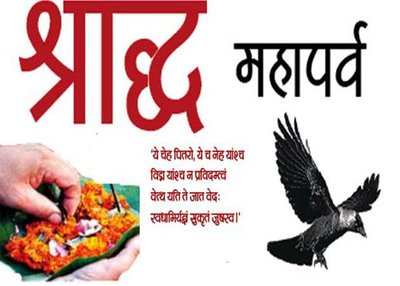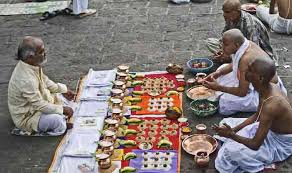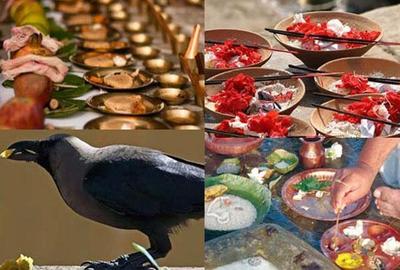|
Should we forget that our ancestors who have endowed us with name, fame, wealth, family business, and heritage? No. Pitra Paksha is the occasion to pay respect and repay the debt of our departed parents, grandparents and great grandparents. Hinduism or Snatana Dharma has festivals not only to celebrate different family relationships, but to also pay reverence to the ancestors after death. The dedicated period during which Hindus remember their ancestors is called Pitra Paksha. During Pitra Paksha, the rites performed are called as Shraaddha or Tarpan, to seek blessings of ancestors. It is time to remember the ties with his lineage. Shrimad Bhagavad Gita, Rishi Kapil’s Samkhya Darshan, Markandya Upanishad, Atharva Veda, Garuda Puran and other Hindu scriptures have explained about subtle body after death, continuation of embodiments after death, about pitra loka & other realms and need of Shraddha (various scriptures are discussed hereunder). Overall, they descrive four types of debts undertaken by human beings - Brahma rin (Supreme god debt), Dev rin (deities’ debt), Rishi or guru rin (debt towards teachers and sages) and Pitra rin (debt or obligation towards parents and ancestors). Why performed: According to Hinduism, the souls of three preceding generations of one's ancestor reside in Pitra–loka, a realm between heaven and earth. The scripture Markandeya Purana says that if the ancestors are content with the shraaddha, they will bestow health, wealth, knowledge and longevity, and ultimately heaven and salvation (moksha) upon the performer. When performed: It is performed for a fortnight in the 2nd paksha Hindu lunar month of Bhadrapada (September) in southern and western India and in Ashwin month in north India & Nepal. It begins on the Pratipada (first day of the fortnight) ending with the no moon day known as amavasya (also known as Pitra Amavasya, Peddala Amavasya, Mahalaya amavasya or simply Mahalaya). The shraaddha is performed on the specific lunar day during the Pitra Paksha, day on which the ancestor died. Special days are allotted for people who died in a particular manner or had a certain status in life. The fourth and fifth lunar day respectively, are allocated for people deceased in the past year. The ninth lunar day is for married women who died before their husband. The twelfth lunar day is for children and ascetics who had renounced the worldly pleasures. The fourteenth day is reserved for those people killed by arms, in war or suffered a violent death. Amavasya is intended for all ancestors, irrespective of the lunar day they died. Those who have forgotten to perform shraddha can do so on this day. How performed: Shraaddha is offering of food and water to the preceding three generations i.e. parents, grandparents and great grand-parents that have already died. Traditionally, performing Shraddha or Tarpan is done as under:
Generation Z: What should I do? 1. Do not buy new expensive stuff - like new buildings, jewelry or other valuables. 2. Avoid non-vegetarian food and consumption of alcohol. 3. On last day of shraadha (i.e. amavasya, new moon) - offering following items to Brahmins (give to temple):
Who perform: Shraaddha is performed by the son for his paternal side of family. For maternal side, daughter’s son can perform Shraaddha for maternal side. Where performed: Shraaddha is performed at home normally. However, Shraaddha performed at Varanasi, Prayaga, Gaya, Kedarnath, Badrinath, Rameswaram and Nasik, have special significance. Precautions for Pitra Paksha: Out of respect of our ancestors, one should keep following things in mind:
Deep Dive: Significance of Shraaddha in Hindu scriptures: Atharva Veda on Shraaddha: There are many verses in Chapter 18 of Atharva Veda relating to appeasing the ancestors and funeral rites. Kāṇḍa 18 has four sūktas and they are known as pitṛmedha sūktas (पितृमेध सूक्त). Pitṛmedha means oblations made to pitṛus. This kāṇḍa begins by offering prayers to Yama, the god of death and his sister Yamī (Yama’s sister is so called in this kāṇḍa – verse 13). In pitṛmedha ceremonies, offerings are always made to Sarasvatī too. Then the performer prays to Sarasvatī to join with his pitṛus (forefathers) and bestow wealth on them. He pleads to Sarasvatī to send the ancestors back to the heaven and those who are reborn should not be made to suffer. Vedas consider pitṛus as one of the gods and they are invoked even during auspicious ceremonies and such ceremonies are called nāndī.) Later, in verses 51 and 52, the performer appeals to his forefathers, “Please be seated on this kusa grass (darbha). We have prepared offerings for you. Please eat these offerings and bless us with disease free life and wealth. If we have committed any mistakes that are common to humanity, please forgive us.” Later the invoked ancestors are given a send-off. The one representing ancestors is addressed as Vasu, Rudra, Āditya (From Aditi were born the 33 devas, 12 Ādityas or solar gods, 8 Vasus or elemental gods, 11 Rudrās or Shivas and 2 Ashwins), representing one’s father (only if father is not alive), grandfather and great grandfather respectively. It is believed that the food offered to him goes to the performer’s forefathers. Vasu, Rudra and Āditya represent three higher planes and Aditya is considered as the highest plane. Verses 54 to 57 are addressed to the departed soul. During annual ceremonies, the subtle bodies (Pitru bodies) are supposed to arrive at the place where annual ceremonial rites are performed. There are certain texts which say that they can eat only through the smell of the food. Hence tasty dishes are prepared during Shraddhas. It is also said that when sesame seeds are fried, pitṛus descend from upper worlds and come to the place where sesame seeds are roasted and they have the capacity to satiate their hunger by inhaling this smell. This is said to be main reason for using sesame seeds in ancestral rites. When they arrive for the smell of sesame seeds, they also bless the family members of the yajamana. Garuda Purana: Garuda Purana deals the details subsequent to death and rites to be performed thereafter. It mentions that if Shraddha rites are performed, the performer and his family are blessed by his ancestors. His father blesses him with sons; grandfather and great grandfather bless him with wealth. Those who perform annual Shraddha rites liberate ancestors and blessed by them. It lays emphasis on various gifts. Gifts are to be interpreted in proper sense. The intent of the Purana is to make one share his riches with others. Sesame seeds and Dharba grass are used in all Shraddha rituals which are considered as sacred. Sesame seeds can destroy evil spirits and can burn all the sins committed by the deceased. Thirst of the corpse is quenched by offering libation with water and sesame seeds. Samkhya Darshan on Subtle body: Maherishi Kapil has mentioned in chapter 2, verse 3 & sub verse 9 of Samkhya Darshan about migration of soul from one body to another as under: सप्तदशैकं लिङ्गम् II3/9 Meaning: Subtle body (10 subtle elements of organs of senses & action, 5 Tanmatra, mind and buddhi -17 elements) always accompanies the soul (Jivatma) as outward covering in migrating to another body. Subtle body also called spiritual body, or rudimentary body or astral body or linga. Shrimad Bhagavad Gita on re-birth: Shree Krishna has explained about eternal soul, Brahman and Prakriti and re-birth in Shrimad Bhagavad Gita, the final text Snatana Dharma. He has outlined about re-birth in chapter 9 and 14 of Shrimad Bhagavad Gita as under: यदा सत्त्वे प्रवृद्धे तु प्रलयं याति देहभृत् । तदोत्तमविदां लोकानमलान्प्रतिपद्यते ॥ १४-१४॥ रजसि प्रलयं गत्वा कर्मसङ्गिषु जायते । तथा प्रलीनस्तमसि मूढयोनिषु जायते ॥ १४-१५॥ Meaning: When a man dies during the preponderance of Sattva, he obtains the clean ethereal worlds (heaven etc.,) attained by men of noble deeds (14.14). When Rajas predominates, he is born among those attached to action; even so, the man who has expired during the preponderance of Tamas is reborn in the species of the deluded creatures such as insects and beasts etc. (14.15). References:
1 Comment
Ram Prasad
10/9/2018 12:47:44 pm
Thank you! This helped me understand the importance of shraadha.
Reply
Leave a Reply. |
Archives
March 2022
Categories |



 RSS Feed
RSS Feed